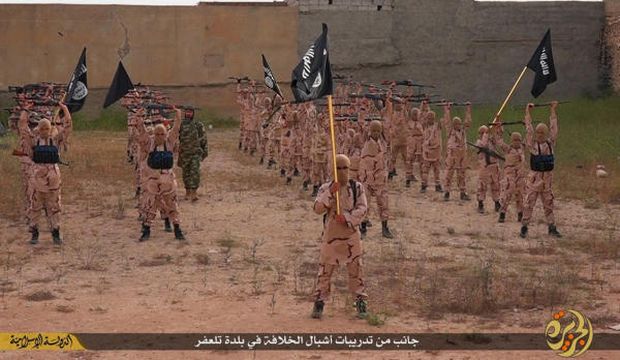
In this photo released on April 25, 2015 by a militant website, which has been verified and is consistent with other AP reporting, young boys known as the “lion cubs” hold rifles and Islamic State of Iraq and Syria (ISIS) flags as they exercise at a training camp in Tal Afar, near Mosul, northern Iraq. (Militant website via AP, File)
Baghdad, AP/Asharq Al-Awsat—Iraq will begin sharing “security and intelligence” information with Russia, Syria, and Iran to help combat the Islamic State of Iraq and Syria (ISIS), the Iraqi military said on Sunday.
A statement issued by the Joint Operations Command said the countries will “help and cooperate in collecting information about the terrorist Da’esh group,” using the Arabic acronym for ISIS.
Sa’ad Al-Hadithi, spokesman for Iraqi Prime Minister Haider Al-Abadi, told Asharq Al-Awsat: “The exchange of information through comprehensive coordination in security and intelligence matters with these countries aims to counter the terrorist threat which everyone is facing now.”
Russian President Vladimir Putin has meanwhile contacted the leaders of Saudi Arabia, Turkey, and Jordan to inform them that Moscow is setting up an intelligence center in Baghdad to help counter the ISIS threat, Russian news agency RIA Novosti reported on Sunday.
Iraq has long had close ties with neighboring Iran and has coordinated with Tehran in fighting ISIS—which controls about a third of Iraq and Syria in a self-declared “caliphate.” Iran has sent military advisers to Iraq and worked closely with Shi’ite militias battling ISIS.
A US-led coalition has been conducting airstrikes against ISIS in Iraq and Syria as well as training and advising Iraqi forces, but US officials insist they are not coordinating their efforts with Iran.
The US also refuses to cooperate with Syrian President Bashar Al-Assad, who Washington has insisted should step down.
US Secretary of State John Kerry, who met with Russian Foreign Minister Sergey Lavrov on Sunday, said in response to the Iraqi statement that “all of the efforts need to be coordinated. This is not yet coordinated.”
“I think we have concerns about how we are going to go forward. That is precisely what we are meeting on to talk about now. Our presidents will be meeting tomorrow,” he told reporters, referring to talks taking place on Monday between US President Barack Obama and Russian President Vladimir Putin.
Lavrov, when asked about the purpose of the cooperation with Iraq, said it was to “coordinate the efforts against ISIL,” using another acronym for ISIS.
Moscow has been ramping up its involvement in Syria in defense of its ally, President Assad. Russia has recently ferried weapons, troops and supplies to an airport near the Syrian coastal city of Latakia in what the US sees as preparations for setting up an airbase there.
The Iraqi military statement said Moscow is increasingly concerned about “the presence of thousands of terrorists from Russia who are carrying out criminal acts with Da’esh.”
Meanwhile, analysts say this latest move by Moscow aims to dovetail with its operations against ISIS in Syria, and increase the Russian presence in the region.
Hisham Al-Hashimi, a researcher on armed groups and militias, told Asharq Al-Awsat some members of the team that will be sent to Baghdad have already been active in Syria.
“They particularly had bases in Damascus and Latakia, and included [members from] Syria, Iran, Russia, Iraq, and Lebanese Hezbollah,” he said.
Iraqi members of the group mainly comprised fighters from Shi’ite militia groups. Their involvement was unofficial but in full knowledge of the Iraqi government, he said.
“Now the agreement is that there will be much fuller cooperation [between these countries, groups] . . . and this will act as a pretext under which Russian planes can fly over Iraq to carry supplies to [the Syrian regime].”
